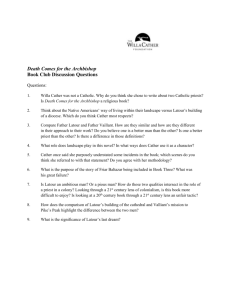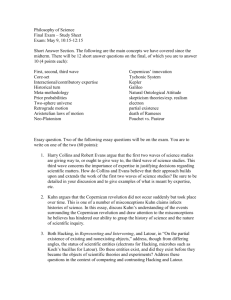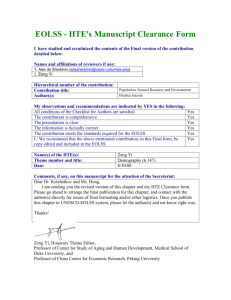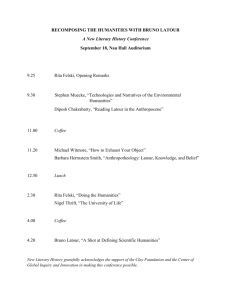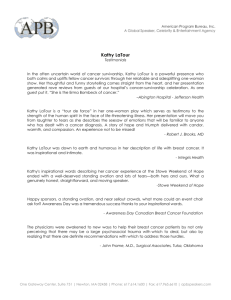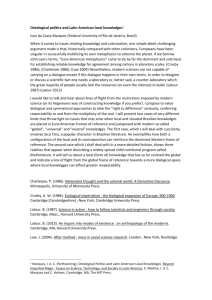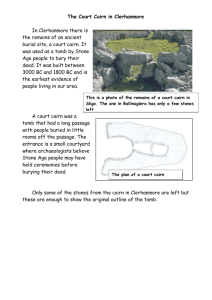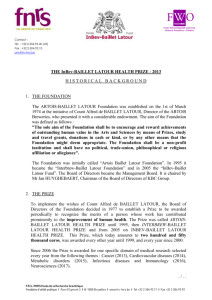Social Production of Knowledge Syllabus, AUB
advertisement
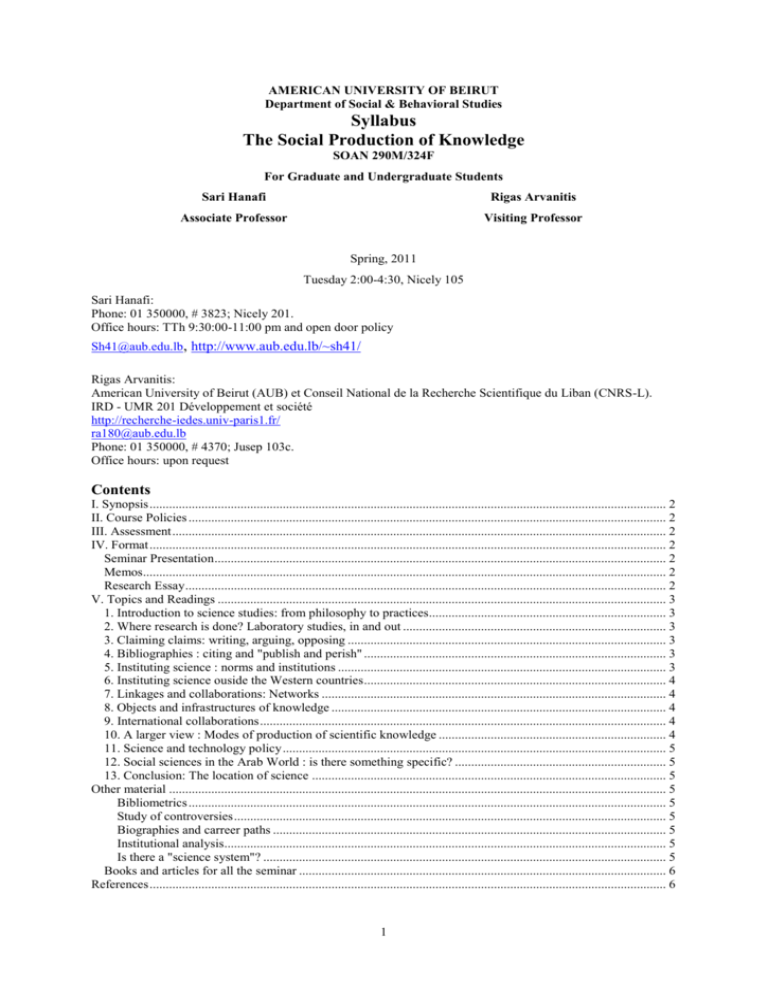
AMERICAN UNIVERSITY OF BEIRUT Department of Social & Behavioral Studies Syllabus The Social Production of Knowledge SOAN 290M/324F For Graduate and Undergraduate Students Sari Hanafi Rigas Arvanitis Associate Professor Visiting Professor Spring, 2011 Tuesday 2:00-4:30, Nicely 105 Sari Hanafi: Phone: 01 350000, # 3823; Nicely 201. Office hours: TTh 9:30:00-11:00 pm and open door policy Sh41@aub.edu.lb, http://www.aub.edu.lb/~sh41/ Rigas Arvanitis: American University of Beirut (AUB) et Conseil National de la Recherche Scientifique du Liban (CNRS-L). IRD - UMR 201 Développement et société http://recherche-iedes.univ-paris1.fr/ ra180@aub.edu.lb Phone: 01 350000, # 4370; Jusep 103c. Office hours: upon request Contents I. Synopsis ............................................................................................................................................................... 2 II. Course Policies ................................................................................................................................................... 2 III. Assessment ........................................................................................................................................................ 2 IV. Format ............................................................................................................................................................... 2 Seminar Presentation ........................................................................................................................................... 2 Memos................................................................................................................................................................. 2 Research Essay .................................................................................................................................................... 2 V. Topics and Readings .......................................................................................................................................... 3 1. Introduction to science studies: from philosophy to practices......................................................................... 3 2. Where research is done? Laboratory studies, in and out ................................................................................. 3 3. Claiming claims: writing, arguing, opposing .................................................................................................. 3 4. Bibliographies : citing and "publish and perish" ............................................................................................. 3 5. Instituting science : norms and institutions ..................................................................................................... 3 6. Instituting science ouside the Western countries ............................................................................................. 4 7. Linkages and collaborations: Networks .......................................................................................................... 4 8. Objects and infrastructures of knowledge ....................................................................................................... 4 9. International collaborations ............................................................................................................................. 4 10. A larger view : Modes of production of scientific knowledge ...................................................................... 4 11. Science and technology policy ...................................................................................................................... 5 12. Social sciences in the Arab World : is there something specific? ................................................................. 5 13. Conclusion: The location of science ............................................................................................................. 5 Other material ......................................................................................................................................................... 5 Bibliometrics ................................................................................................................................................... 5 Study of controversies ..................................................................................................................................... 5 Biographies and carreer paths ......................................................................................................................... 5 Institutional analysis........................................................................................................................................ 5 Is there a "science system"? ............................................................................................................................ 5 Books and articles for all the seminar ................................................................................................................. 6 References ............................................................................................................................................................... 6 1 I. Synopsis This seminar will focus on how knowledge is being produced worldwide and in the Arab region. We will begin by outlining the current theorists in this field (Latour, Callon, Star, Bowker, Shapin, Barnes, Pickering...), underlining the importance of social practices to scientific work (laboratory work, publication practice, collaborative exchange, inter-institutional networking, international research and communication activities). The objective is thus not to privilege a specific theory but to identify patterns in scientific practice and the institutional setting. We will thus familiarize with approaches and identify some specific methodological tools related to the sociology and anthropology of scientific and technological knowledge (bibliometrics, studies of controversies, institutional surveys, ethnography of scientific practices). Great care will be given to locate these issues in the specific context of the Arab region and on the development of research activities in emerging countries. Finally, we will address the globalization of scientific activities (international scientific collaborations, world science networks, international research programs, international institutions), and the influence it has on the local production of knowledge. II. Course Policies 1- You are strongly encouraged to participate in the discussion periods during classes and indeed beyond the classroom. It will make the classes more interesting and vibrant. 2- You should have a sense of responsibility. Class attendance is required and assessed. Coming late is not permitted without a proper justification. If you are absent, you should send a three–page summary of the reading before the next class. 3- You should read the required materials each week. Otherwise, you should send me by email a three–page summary of the reading before the following class. This also applies if you miss the class. 4- It is strictly prohibited to use or to show mobile phones during the class. 5- Academic integrity The heart of the teaching profession is integrity. Any violation of academic integrity will NOT be tolerated and will result in serious repercussions. Please refer to AUB policies and procedures on academic integrity. http://pnp.aub.lb/university/handbook/158010044.html III. Assessment 1. 2. 3. 25% 30% 45% Class Attendance, class presentation and participation 3 memos Research paper (Due May 5) IV. Format The course will be held in the form of a seminar, including lectures and class discussions. Seminar Presentation Each student is required to give an oral presentation on a chosen topic. The presentation should be no more than 20-25 minutes. Presentation will be based on the assigned readings (with *) and the other readings. Presenter will provide a synthesis of the assigned readings and raise questions, counterarguments and connections to other theoretical issues, or comparisons with other places and times. I will select two students to react on the presentation and on the reading. Then discussion will be then open to the whole class. Students will bring the assigned readings and prepare some quotes to be discussed. Memos Students will submit a 3-page memo each four weeks for a total of three memos for the semester. You present your reaction to your readings. Memos are not a summary of the readings but an analytical account of them. You should highlight some quotes from the readings. Memos are to be submitted on time (due respectively on 14 March, 11 April, 9 May) exclusively through Moodle. Research Essay 2 Each student will choose a topic related to the social production of knowledge. S/he will send us one or two paragraph in how s/he will approach the topic and the suggested bibliography, to be approved by us. Students will be expected to explore the topic in an original fashion, applying concepts they learn in the seminar. The research may be conducted from written primary and secondary source materials and supplemented by original research which may include interviews and observation fieldwork, taking care to follow professional standards of social science methodologies. A 4000-words research paper, must follow normal standards of an essay with proper referencing, introduction, discussion and conclusion. Paper is to be submitted by May 5, 2011 exclusively through Moodle. V. Topics and Readings 1. Introduction to science studies: from philosophy to practices Epistemology, philosophy of science, all this was changed with the advent of a more "social" history of science. Thomas Kuhn and the scienfic paradigm; Latour shows that science in the making is different from science in the books; Science is culture and practice. - * Thomas Kuhn: chapter 4 + Postface to 2nd edition (on paradigms) (Kuhn 1970) - * Latour Science in Action Introduction - * Pickering: the mangle of practice, chap.1 (Pickering 1995) - Knowledge as practice (Vinck 2007) - Forms of knowledge: from intro, pp.1-10 of Cohendet and Amin: (2004) + Chapter 4 - Poitou (Poitou 2007) (French only) - Pragmatic approach to knowledge or the durkheimian foundations of knowledge (Thévenot 1998) (in French) - Gieryn on boundary work in Handbook 2. Where research is done? Laboratory studies, in and out Opening the blackbox of science. The laboratory. Next, where do scientists speak: in articles. Introduction to translation theory. - * Laboratories: Latour - Science in Action Chapter 2 - * Give me a laboratory and I will raise the world (Latour 1983) - * Translation: Latour Science in Action: chapter 4 - Laboratory studies (Vinck 2007) - Boundary objects (Trompette & Vinck 2009; Trompette & Vinck 2010) 3. Claiming claims: writing, arguing, opposing - * The rhetoric of an article (Latour & Fabbri 1977). In English in "Technostyle" - * Latour Science in Action (chapter 1) - * Latour, Bruno & Woolgar, Steve (1986) Laboratory life: the construction of scientific facts. Chapter 3. - Callon on scallops ! (Callon 1986) 4. Bibliographies : citing and "publish and perish" - * Glänzel on citation analysis, Chapter 4 of his course on bibliometrics (Glänzel 2001) - * Terttu Luukkonen on theory of citations (Luukkonen 1997) - * Hanafi / Arab East Universities (2011) - Citation contexts: (Cozzens 1985) - Burawoy - Price on cumulative advantages (Price 1976) 5. Instituting science : norms and institutions The historical and social process of institutionalizing science. The case of developing countries. A. Dennis on why Merton speaks about norms: the threat of industrial R&D against the universities - * Communities :Robert Merton (1957) “Science and Democratic social Structure’ in Social Theory and Social Structure”. 3 - * Mulkay's analysis (1976) - * A. Dennis (1987) - * Lenoir on discipline (chap 3) (1997) - * History of institutions: EOLSS article of Inkster on the central role played by the State (Inkster 2001) - T. Shinn, chapter 1 (in French) (2005) - Historians: The scientific enterprise (Inkster chap.4) - Disciplines vs institutions : Bonneuil and Petitjean (1997) - Ways of focusing linked to institutions (Ragouet, Shinn, et al. 1997) - Simon & Shaffer Leviathan 6. Instituting science ouside the Western countries The historical and social process of institutionalizing science. The case of developing countries. - * Vessuri: instituting science in the developing world (Chapter of Vesuri in "The uncertain quest" 1994) - * Empirical evidence: Article of Gaillard (1994) on scientific communities - * Communities : the developing world (introduction of Gaillard, Krishna, et al. 1997) - Shinn, Spaapen and Krishna (Shinn, Spaapen, et al. 1997) introductory essay - Non hegemonic countries (Losego & Arvanitis 2008) - People count: Vessuri on Nicolas Bianco (Vessuri 1997) (local/global) - Ali EL Kenz on Algeria : Prometheus and Hermes (El Kenz 1997) - Sciences hors d'occident (French) : a complete collection of articles on the theme 7. Linkages and collaborations: Networks - * Networks: chapter on networks (Wagner 2008) - * Collins: tacit knowledge and scientific networks - * What is a research colaboration : Katz and Martin - Strategic alliances (Vonortas & Murphy 2001) - Learning through alliances (chap.8) of Tidd, Bessant and Pavitt (Tidd, Bessant, et al. 1997) 8. Objects and infrastructures of knowledge Research is all about practices and objects. What is scientific object? How are frontiers drawn? What role is played by scientific infrastructure? - * S. Leigh Star: "This is not a boundary object" - * Bowker on infrastructure (Bowker 2001) - Star on boundary objects (Star & Ruhleder 1996) - Bowker on Biodiversity - Forms of knowledge: from intro, pp.1-10 of Cohendet and Amin: (2004) + Chapter 4 copy - Databases are central knowledge objects: chapter 1 of "Sorting things out" (Bowker & Star 1999) 9. International collaborations General frame for international scientific collaborations. Collaborations and co-operation. - * Wagner - chapter 1 + next chapter after theory - * An empirical investigation into the new claims : (Hicks & Katz 1996) - * Weidemann (Weidemann 2010) - EU report on Drivers of international research collaborations (Boekholt, Edler, et al. 2009) - EULAKS report Arvanits, Gaillard & Gaillard 10. A larger view : Modes of production of scientific knowledge Proposals made in order to identify the larger context in which science is done. National system of innovation, research system, new modes of knowledge production. The institutional context of research. - * Callon (1995) on the 4 models of science - * New modes of production (Gibbons, Limoges, et al. 1994) introduction + chapter 1 - * Triple helix - (Etzkowitz & Leydesdorff 1997) chapter 14 4 - Reviewing the debate : (Hessels & van Lente 2008) - The scientific estate in history: (Inkster 1991) - (Pestre 2003) - The transversalist approach of Shinn : (Shinn 2002; Shinn & Ragouet 2005) 11. Science and technology policy We are then left with some queries: - networks rather than communities ? - new agents (or actors) like "intermediate" agents - actors acting, assembling strong conglomerates, political but also material - practices are essential for knowledge, knowledge is a practical embodied activity, based on material objects and circulating in built infrastructure. So what policy should there be? - * Rigas EOLSS on S&T policy (Arvanitis 2001) - * Amsden, Chap.1 (2001) - Nelson on "social technology" (2008) - Busch - Salomon JJ Science and Politics (Salomon 1973) - Salomon JJ - article in EOLSS (Salomon 2001) - Elzinga in Handbook - Cozzens in Handbook - Waast (fr) 12. Social sciences in the Arab World : is there something specific? - * Social sciences in the Arab World: (Arvanitis, Waast, et al. 2010) - * Literature of the social sciences in the Arab World: (Waast, Arvanitis, et al. 2010) - * Lebanon (Kabbanji 2010) - * Jordan : (Al Husban 2010) - Gaillard on Lebanese science system (Gaillard 2010) - Wiebke (Fr) (Keim 2010; Keim 2010) - Pontille on sociology (Pontille 2003) 13. Conclusion: The location of science Final session of the seminar, discussion on the various aspects seen in the seminar; science is both located geographically and intellectually; aspects not covered by the seminar will be mentioned. The challenge of scientific activity in a small country. Other material * Bibliometrics * Controversies * Biographies * Institutional analysis * Surveys on communities * Ethnogaphic of practices Bibliometrics - Leydesdorff - Bibliometrics (general introduction) : Glänzel - SSK analysis of technology (Bijker etc.) - Akrich - Special issues of RAC on boundary objects Study of controversies - Callon on scallops Biographies and carreer paths - Shapin - Bozeman and Dietz - Canibano Institutional analysis - Mouton & Waast template - Rigas Arvanitis - Method of ESTIME Is there a "science system"? Descriptive Methodology: combine sources See UNESCO policy documents seem not to agree on that... - State of science in Africa (Waast) 5 - Arvanitis (coord) - ESTIME - Mouton & Waast - Metastudy Books and articles for all the seminar - The "Handbook" : (Jasanoff, Markle, et al. 1995) - Reader: Barnes and Edge (1982) - Rigas on S&T policy (Arvanitis 2001) - (Arvanitis, Grossetti, et al. 2008) - Shinn, Spaapen and Krishna (Shinn, Spaapen, et al. 1997) - Gaillard, Krishna & Waast (Gaillard, Krishna, et al. 1997) - Akrich, Callon, Latour - textes fondateurs (in French) (Akrich, Callon, et al. 2006) - Latour "Science in Action" (1987) - Pickering: the mangle of practice (1995) References Akrich, Madeleine, Michel Callon & Bruno Latour (eds) (2006) Sociologie de la traduction : Textes fondateurs: Presses de l'École des mines). Al Husban, Abdel Hakim (2010) 'Internationalisation of the Humanities and the Social Sciences: Realities and Chaleenges in Jordan', in M. Kuhn & D. Weidemann (eds), Internationalization of the Social Sciences. Asia - Larin America Middle East - Africa - Eurasia (Bielefeld: Transcript): 191-212. Amsden, Alice H. (2001) The Rise of "the Rest". Challenges to the West from Late-Industrializing Economies (Oxford (UK): Oxford University Press). Arvanitis, Rigas (2001) '1.30 Science and technology policy : Introduction and trends', in R. Arvanitis (ed), Science and Technology Policy, Encyclopedia of Life Support Systems (EOLSS) (London & Paris: EOLSS Publishers/UNESCO). Arvanitis, Rigas, Michel Grossetti, Kapil Raj, Pascal Renaud & Frédéric Thomas (2008) 'Sciences, savoirs et mondialisations', Revue Science et devenir de l'Homme - Dossier : Science, technologie et innovation en sociétés 57-58:48-69. Arvanitis, Rigas, Roland Waast & Abdel Hakim Al Husban (2010) 'Social sciences in the Arab World', in, World Social Science Report (Paris: UNESCO): 68-72. http://unesdoc.unesco.org/images/0018/001883/188333e.pdf (rapport complet) Barnes, B. & D. Edge (1982) Science in Context: Readings in the Sociology of Science (Cambridge, Mass.: MIT Press). Boekholt, Patries, Jakob Edler, Paul Cunningham & Kieron Flanagan (eds) (2009) Drivers of International collaboration in research. Final Report (Luxembourg: European Commission, DG Research, International Cooperation (EUR 24195)). Bonneuil, Christophe & Patrick Petitjean (1997) 'Science and the Colonial Policy: Creation of the ORSTOM (19361943)', in T. Shinn, J. Spaapen & V.V. Krishna (eds), Science and Technology in a Developing World (Dordrecht: Kluwer): 129-78. Bowker, Geoffrey C. (2001) 'The new knowledge economy and science and technology policy (article 1.30.3.5)', in R. Arvanitis (ed), Science and Technology Policy. A section of the Encyclopedia of Life Support Systems (on-line) (London: EOLSS Publishers/UNESCO). http://www.eolss.net/ Bowker, Geoffrey C. & Susan Leigh Star (1999) Sorting Things Out: Classification and its Consequences (Cambridge, MA: MIT Press). Callon, Michel (1986) 'Some elements of a sociology of translation : domestication of the scallops and the fishermen of Saint Brieuc Bay', in J. Law (ed), Power, Action and Belief. A new sociology of knowledge ? (London: Sociological Review Monograph 38 / Routledge): 169-208. Callon, Michel (1995) 'Four Models for the dynamics of science', in S. Jasanoff, G.E. Markle, J.C. Petersen & T. Pinch (eds), Handbook of Science and Technology Studies (London-New Delhi: Sage): 29-63. Cohendet, Patrick & Ash Amin (2004) Architectures of knowledge. Firms, capabilities and communities (New York: Oxford University Press). Cozzens, Susan E. (1985) 'Comparing the Sciences: Citation Context Analysis of Papers from Neuropharmacology and the Sociology of Science ', Social Studies of Science 15(1):127-53. Dennis, M. Aaron (1987) 'Accounting for Research: New Histories of Corporate Laboratories and the Social History of American Science', Social Studies of Science 17(3, August):479-518. El Kenz, Ali (1997) 'Prometheus and Hermes ', in T. Shinn, J. Spaapen & V.V. Krishna (eds), Science and Technology in a Developing World (Dordrecht: Kluwer): 323-48. Etzkowitz, Henry & Loet Leydesdorff (eds) (1997) Universities in the Global Knowledge Economy. A Triple Helix of University-Industry-Government Relations (London: Pinter). Hanafi, Sari (2011) "University Systems in the Arab East: Publish Globally and Perish Locally Vs. Publish Locally and Perish Globally". Current Sociology. Sage: International Sociological Association. Vol. 59, no 6. Gaillard, Jacques (1994) 'The behaviour of scientists and scientific communities', in J.-J. Salomon, F. Sagasti & C. SachsJeantet (eds), The uncertain quest: science, technology, and development (Tokyo, New York & Paris: UNU Press): 213-49. http://unu.edu/unupress/unupbooks/uu09ue/uu09ue00.htm#Contents 6 Gaillard, Jacques (2010) 'Science and Technology in Lebanon: a university-driven activity', Science, Technology & Society 15(2):271-307. Gaillard, Jacques, V.V. Krishna & Roland Waast (eds) (1997) Scientific communities in the developing world (New Delhi & London: Sage). http://www.bondy.ird.fr/pleins_textes/pleins_textes_7/sous_copyright/010009927.pdf Gibbons, Michael, Camille Limoges, Helga Nowotny, Simon Schwartzman, Peter Scott & Martin Trow (1994) The new production of knowledge. The dynamics of science and research in contemporary society (London: Sage). Glänzel, Wolfgang (2001) 'Bibliometrics as a research field'. Hessels, Laurens K. & Harro van Lente (2008) 'Re-thinking new knowledge production: A literature review and a research agenda', Research Policy 37(4):740-60. http://www.sciencedirect.com/science/article/B6V77-4S1JJY61/2/8a5ae220f21b28e18c2b13a323518a95 Hicks, Diana M. & Sylvan J. Katz (1996) 'Where is science going ?', Science, Technology & Human Values 21(4):379-406. Inkster, Ian (1991) Science and technology in History. An approach to indusrial development (London: Macmillan). Inkster, Ian (2001) '1.30.1.9 The National Imperative. The State, Science and Technology, and Policy Evolution circa 14002000', in R. Arvanitis (ed), Theme : Science and Technology Policy (Encyclopedia of Life Support Systems: EOLSS Publishers/UNESCO): http://www.eolss.net/. Jasanoff, Sheila, Gerald E. Markle, James C. Petersen & Trevor Pinch (eds) (1995) Handbook of Science and Technology Studies (London-New Delhi: Sage). Kabbanji, Jacques (2010) 'Internationalisation of Social Sciences: The Lebanese experience in Higher Edication and Researcch', in M. Kuhn & D. Weidemann (eds), Internationalization of the Social Sciences. Asia - Larin America Middle East - Africa - Eurasia (Bielefeld: Transcript): 213-36. Keim, Wiebke (2010) 'The internationalization of the social sciences: distortions, dominations and prospects', in, World Social Sciences Report (Paris: UNESCO): 169-70. http://unesdoc.unesco.org/images/0018/001883/188333e.pdf (rapport complet) Keim, Wiebke (2010) 'Pour un modèle centre-périphérie dans les sciences sociales. Aspects problématiques des relations internationales en sciences sociales ', Revue d'Anthropologie des Connaissances 4(3):570-98. http://www.cairn.info/revue-anthropologie-des-connaissances-2010-3-page-570.htm Kuhn, Thomas S. (1970) The Structure of Scientific Revolutions (First edition 1962, revised edition, Chicago: The University of Chicago Press). Latour, Bruno (1983) 'Give me a laboratory and I will raise the world', in K. Knorr Cetina & M. Mulkay (eds), Science Observed. Perspectives on the Social Study of Science (London: Sage): 141-70. Latour, Bruno (1987) Science in Action (Cambridge, Mass.: Harvard University Press). Latour, Bruno & Woolgar, Steve (1986) Laboratory life: the construction of scientific facts. Princeton University Press, 1986 Latour, Bruno & Paolo Fabbri (1977) 'La rhétorique de la science: pouvoir et devoir dans un article de science exacte', Actes de la Recherche en Sciences Sociales Février 1977:81-95. Lenoir, Timothy (1997) Instituting Science. The Cultural Production of Scienctific Discplines (Stanford, California: Stanford University Press). Losego, Philippe & Rigas Arvanitis (2008) 'Science in non-hegemonic countries', Revue d'Anthropologie des Connaissances 2(3):343-50. http://www.cairn.info/load_pdf.php?ID_ARTICLE=RAC_005_0343 http://www.cairn.info/revue-anthropologie-des-connaissances-2008-3-page-343.htm Luukkonen, Terttu (1997) 'Why has Latour's theory of citations been ignored by the bibliometric community? discussion of sociological interpretations of citation analysis', Scientometrics 38(1):27-37. Mulkay, Michael (1976) 'Norms and Ideology in Science', Social Science Information 15(4/5):637-56. Nelson, Richard R. (2008) 'What enables rapid economic progress: What are the needed institutions?', Research Policy 37(1):1-11. Pestre, Dominique (2003) 'Regimes of Knowledge Production in Society: Towards a More Political and Social Reading', Minerva 41(3):245-61. http://dx.doi.org/10.1023/A:1025553311412 Pickering, Andrew (1995) The mangle of practice. Time, agency and science (Chicago: Chicago University Press). Poitou, Jean-Pierre (2007) 'Des techniques de gestion des connaissances à l'anthropologie des connaissances', Revue d'Anthropologie des Connaissances: 11-34. http://www.cairn.info/article.php?ID_REVUE=RAC&ID_NUMPUBLIE=RAC_001&ID_ARTICLE=RAC_001_0 011 Pontille, David (2003) 'Authorship Practices and Institutional Contexts in Sociology: Elements for a Comparison of the United States and France ', Science, Technology & Human Values 28(2):217-43. Price, Dereck de Solla (1976) 'A General Theory of Bibliometric and other Cumulative Advantage Processes', Journal of the American Society for Information Science 27(5):292‐ 306. Ragouet, Pascal, Terry Shinn & Roland Waast (1997) 'Science for the South/Science for the North. The Great Divide? ORSTOM versus CNRS', in T. Shinn, J. Spaapen & V.V. Krishna (eds), Science and Technology in a Developing World (Dordrecht: Kluwer): 179-209. Salomon, Jean-Jacques (1973) Science and politics (London: Macmillan). Salomon, Jean-Jacques (2001) '1.30.1.1. Social Sciences, Science Policy Studies, Science Policymaking', in R. Arvanitis (ed), Theme : Science and Technology Policy (Encyclopedia of Life Support Systems: EOLSS Publishers/UNESCO): http://www.eolss.net/. Shinn, Terry (2002) 'Nouvelle production du savoir et triple hélice: Tendances du prêt-à-penser les sceinces', Actes de la Recherche en Sciences Sociales mars:21-30. Shinn, Terry & Pascal Ragouet (2005) Controverses sur la science. Pour une sociologie transversaliste de l’activité scientifique. (Paris: PUF, Raison d’agir). 7 Shinn, Terry, Jack Spaapen & V.V. Krishna (eds) (1997) Science and Technology in a Developing World (Dordrecht: Kluwer). Star, Susan Leigh & Karen Ruhleder (1996) 'Steps Toward an Ecology of Infrastructure: Design and Access for Large Information Space', Information Systems Research 7(1):111-34. Thévenot, Laurent (1998) 'Pragmatiques de la connaissance', in A. Borzeix, A. Bouvier & P. Pharo (eds), Sociologie et connaissance. Nouvelles approches cognitives (Paris: Editions du CNRS). Tidd, Joe, John Bessant & Keith Pavitt (1997) Managing innovation. Integrating technology, market and organizational change (Chichester & Mew York: Wiley). Trompette, Pascale & Dominique Vinck (2009) 'Revisiting the notion of boundary object', Revue d'Anthropologie des Connaissances 3(1):3-25. http://www.cairn.info/load_pdf.php?ID_ARTICLE=RAC_006_0003 http://www.cairn.info/revue-anthropologie-des-connaissances-2009-1-page-3.htm Trompette, Pascale & Dominique Vinck (2010) 'Back to the notion of boundary object (2)', Revue d'Anthropologie des Connaissances 4(1):i-xvii. http://www.cairn.info/revue-anthropologie-des-connaissances-2010-1-page-i.htm Vessuri, Hebe (1997) 'Exploring the Role of Local Leadership as a Catalyst of Scientific Development', in T. Shinn, J. Spaapen & V.V. Krishna (eds), Science and Technology in a Developing World (Dordrecht: Kluwer): 299-321. Vessuri, Hebe M.C. (1994) 'The institutionalization process', in J.-J. Salomon, F. Sagasti & C. Sachs-Jeantet (eds), The uncertain quest: science, technology, and development (Tokio, New York & Paris: UNU Press): 177-212. Vinck, Dominique (2007) 'Back to the laboratory as a knowledge production space', Revue d'Anthropologie des Connaissances 1(2):160-66. http://www.cairn.info/load_pdf.php?ID_ARTICLE=RAC_002_0160 http://www.cairn.info/revue-anthropologie-des-connaissances-2007-2-page-160.htm Vinck, Dominique (2007) 'That obscure knowledge object', Revue d'Anthropologie des Connaissances 1(1):I-VI. http://www.cairn.info/load_pdf.php?ID_ARTICLE=RAC_001_0006 http://www.cairn.info/revue-anthropologie-des-connaissances-2007-1-page-6.htm Vonortas, Nicholas S. & Patrick M. Murphy (2001) 'Strategic innovation alliances ', in R. Arvanitis (ed), Science and Technology Policy. A section of the Encyclopedia of Life Support Systems (on-line) (London: EOLSS Publishers/UNESCO). http://www.eolss.net/ Waast, Roland, Rigas Arvanitis, Claire Richard-Waast & Pier Luigi Rossi (2010) 'What do social sciences in North African countries focus on?', in, World Social Sciences Report (Paris: UNESCO): 176-80. http://unesdoc.unesco.org/images/0018/001883/188333e.pdf (rapport complet) Wagner, Caroline (2008) The New Invisible College. Science for Development (Washington D.C.: Brookings Institution Press ). Weidemann, Doris (2010) 'Challenges of International Collaborations in the Social Sciences', in M. Kuhn & D. Weidemann (eds), Internationalization of the Social Sciences. Asia - Larin America - Middle East - Africa - Eurasia (Bielefeld: Transcript): 353-78. 8
